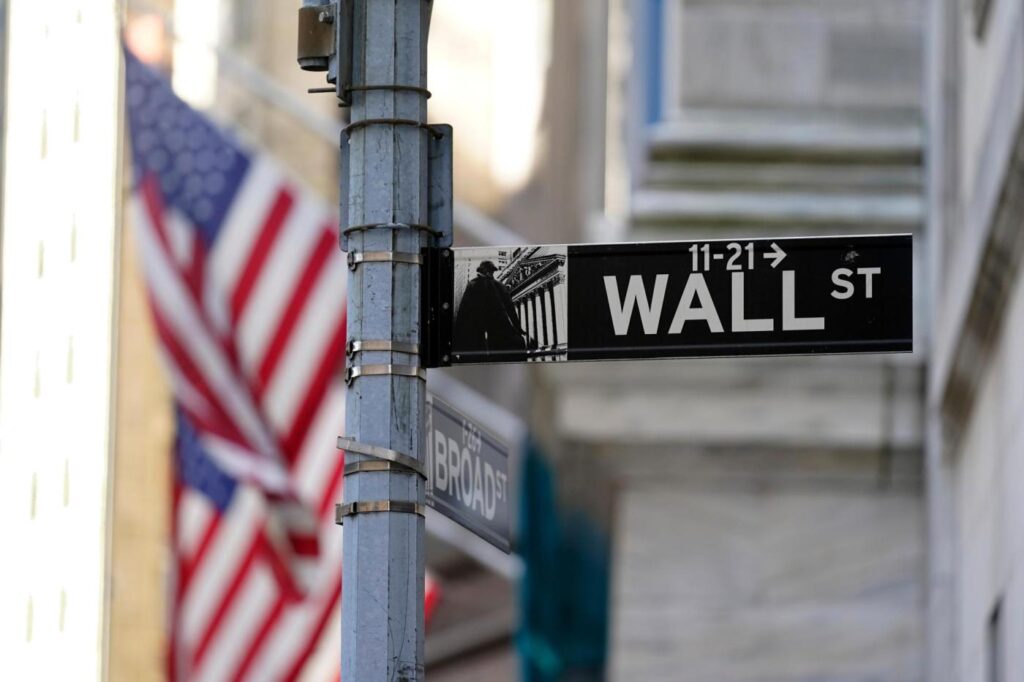
By DAMIAN J. TROISE and ALEX VEIGA
Stocks fell in afternoon trading on Wall Street Wednesday and bond yields rose as investors try to estimate how quickly the Federal Reserve will raise interest rates and take other steps to fight inflation.
The S&P 500 was 1% lower as of 1:40 p.m. Eastern, adding to losses from a day earlier. Investors are waiting for the release of the minutes from the Fed’s last policy meeting, which could shed more light on how drastically the central bank will reverse measures meant to keep long-term rates low. A day earlier, Fed Governor Lael Brainard said that process could start as soon as May and at a rapid pace.
Technology companies has some of the biggest losses, which dragged the Nasdaq 2% lower and weighed heavily on the broader market. Higher interest rates tend to most hurt stocks that are seen as the priciest, which includes big technology companies. Apple fell 1.6% and Microsoft shed 3.7%.
The Dow Jones Industrial Average fell 144 points, or 0.4%, to 34,495.
Communications companies, retailers and others that rely on direct consumer spending also fell. Amazon fell 2.5% and Facebook parent Meta fell 3.4%.
The Fed has already started raising its benchmark short-term interest rate and is expected to continue hikes throughout the year. Traders are pricing in a nearly 77% probability the Fed will raise its key overnight rate by half a percentage point at its next meeting in May. That’s double the usual amount and something the Fed hasn’t done since 2000.
“Even though we’ve known about the coming rate hikes, its been pretty difficult for long term equity managers across the board,” said William Huston, chief investment officer at Bay Street Capital Holdings.
Bond yields rose sharply again. The yield on the 10-year Treasury jumped to 2.59% from 2.54%. The yield, which is used to set interest rates on mortgages and many other kinds of loans, is the highest it’s been in three years.
Inflation is running at a four-decade high and threatens to crimp economic growth. Higher prices on everything from food to clothing have raised concerns that consumers will eventually pull back on spending. Russia’s invasion of Ukraine has added to those worries pushing energy and commodity prices, including wheat, even higher.
U.S. benchmark crude oil prices fell 3.8% Wednesday, but are more than 30% for the year. That has pushed gasoline prices higher, putting more stress on shipping costs, prices for goods and consumers’ wallets.
Treasury Secretary Janet Yellen warned a House panel Wednesday that the conflict will have “enormous economic repercussions in Ukraine and beyond.”
The conflict in Ukraine continued prompting financial pressure against Russia. The White House said Western governments will ban new investmen t in Russia following evidence its soldiers deliberately killed civilians in Ukraine. The U.S. Treasury said President Vladimir Putin’s government will be blocked from paying debts with dollars from American financial institutions, potentially increasing the risk of a default.
European governments have resisted appeals to boycott Russian gas, Putin’s biggest export earner, due to the possible impact on their economies.
It’s been a mostly quiet day for corporate news, so far, ahead of the latest round of corporate earnings. JetBlue Airways fell 7.4% after offering to buy rival budget airline Spirit for $3.6 billion and break up a plan for Spirit to merge with Frontier Airlines. Spirit fell 1.8%.
